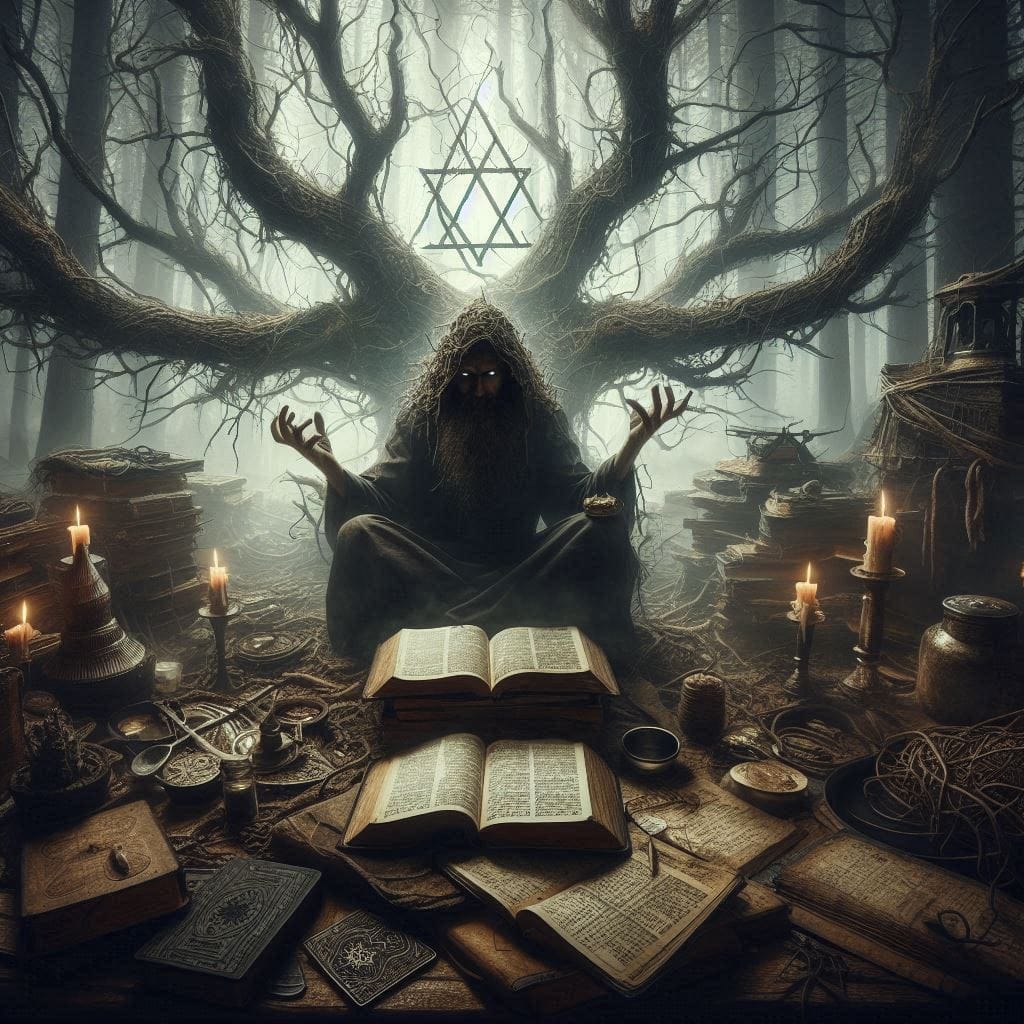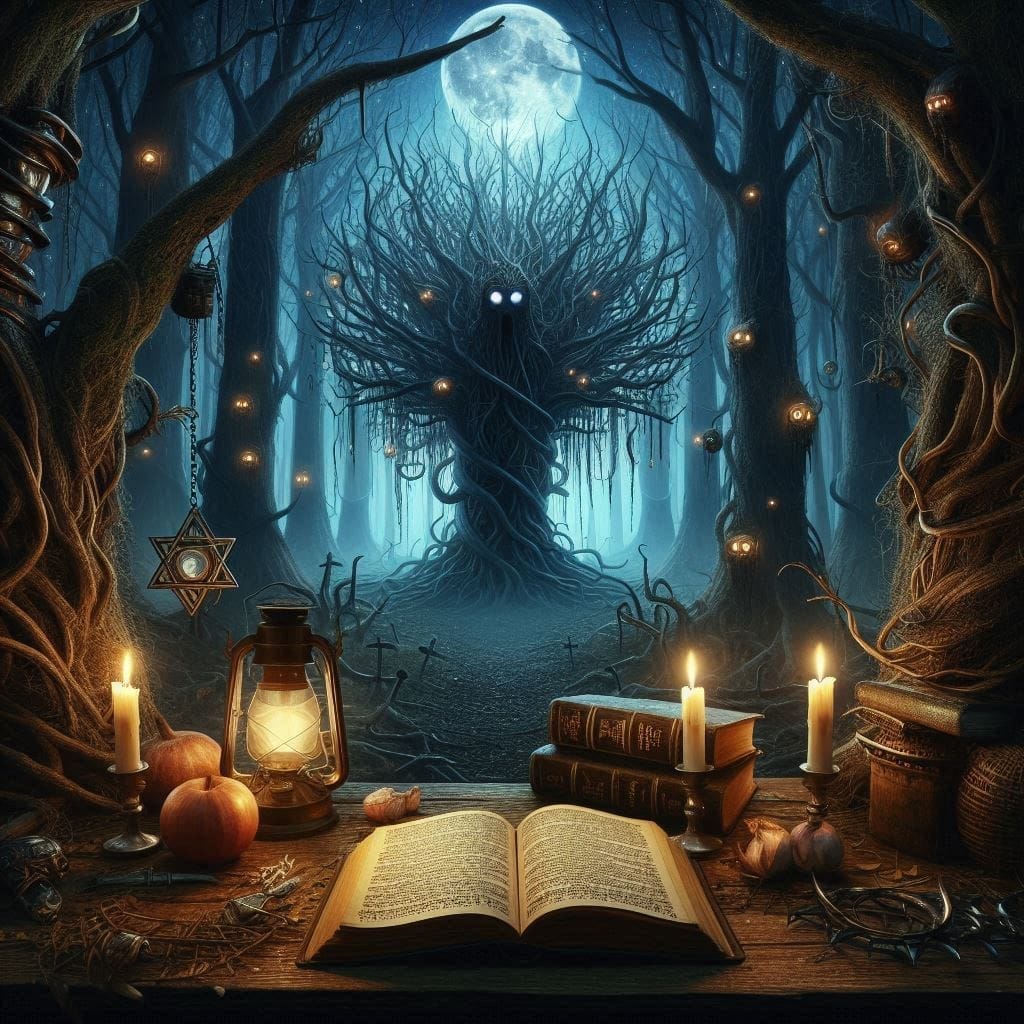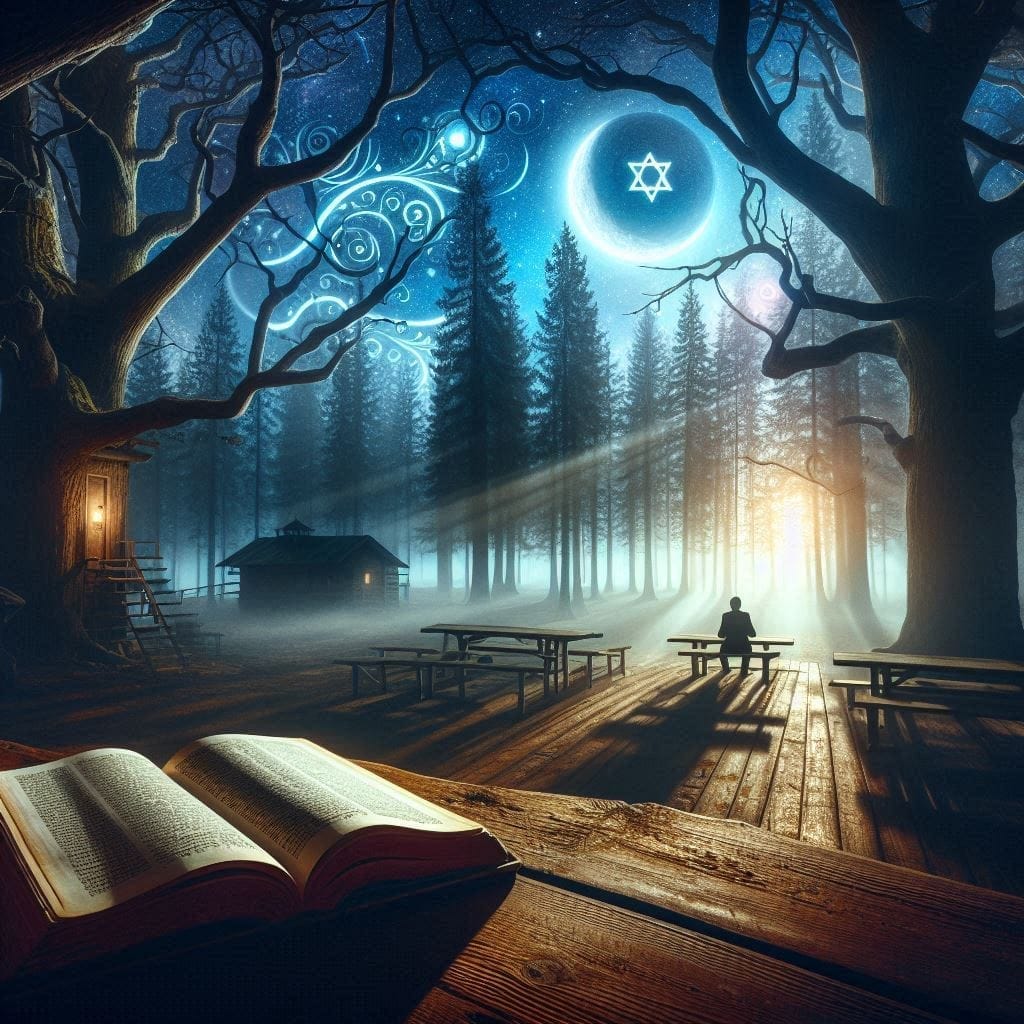
Conspiracy: The Good but Dangerous Fruit — A Torah-Based Critique of the Hebrew Roots Movement’s Conspiratorial Thinking
B"H
Full Disclaimer
This lecture is not intended to replace medical advice or scientific consultation. It is a Torah-based spiritual framework for discerning between holy healing and spiritual deception, as found and inspired in the writings of the Rambam, the Talmud, Halakhic Midrashim and above all The Torah.
At the same time, we recognize that this is a very sensitive subject. We have lost people — friends, family, elders, young ones — to illness, complications, or difficult decisions around treatment. This message is not meant to dishonor anyone’s life or death. It does not speak lightly of what anyone has gone through.
In America, we have the freedom to believe, to research, to act — as long as we do not harm others. This teaching respects that freedom and urges compassion and humility in all such conversations.
There are truths on both sides:
• Yes, there are legitimate concerns about aspects of the medical system, especially where vaccinations, coercion, or scare tactics have been used to pressure or mislead.
• And yes, some people truly need medications — for blood pressure, diabetes, or inherited conditions — that are not the result of personal failure or lifestyle, but simply part of the natural rhythms of human life.
In Kabbalah, illness originates from the sin of Adam and Chavah eating from the Tree of Knowledge of Good and Evil, which caused a rupture in creation and introduced the mingling of good and evil into the human body and soul. This act concealed divine light and disrupted the harmony between the upper and lower worlds, leading to the entry of spiritual impurity (tumah) and the imbalance between soul and flesh. Illness is both physical and spiritual — it is a manifestation of this spiritual distortion, a symptom of the world’s disconnection from its Source, awaiting tikkun (rectification).
This teaching is not a blanket condemnation or endorsement of medicine. It is a call to return to honest, spiritually aligned healing, to ask, What would Hashem want? What preserves life, truth, and holiness?
The Answer is:
Whatever allows you to fulfill your purpose in this world.
If HaShem is guiding you to use medication so that you can have the strength to study Torah, teach Torah, raise your children in holiness, or simply walk in joy — then you should take it, and bless Him for this temporary or full healing.
But if HaShem is showing you that a certain medicine would cloud your clarity, dim your spirit, or distance you from your purpose — then with trust in Him, choose a different path, and He will provide strength, healing, and wisdom through other means.
The key is not whether a pill is “good” or “bad” — the key is emunah, discernment, and walking with Hashem, not with fear or rebellion, but with a heart tuned to His will.
Most importantly: This message is not to tarnish the memory of those we’ve have all lost, whether they chose treatment or not. It is to help us, the living, walk forward with clarity, conviction, and compassion, guided by Torah.

Introduction: The Allure of Forbidden Knowledge
"Conspiracy—the good but dangerous fruit." Like the Tree of Knowledge of Good and Evil in the Garden of Eden, conspiracy thinking offers a compelling temptation: secret knowledge, hidden truths, forbidden insights that “they” don’t want you to know. It promises empowerment and discernment, but often at the cost of trust, h
Nowhere is this more apparent than in the Hebrew Roots Movement (HRM), a growing restorationist current within non-Jewish religious circles that seeks to reclaim the “original” Jewish faith of Yeshua. But rather than building bridges with traditional Judaism or honestly exploring early Jewish-Christian history, HRM frequently defines itself by conspiratorial opposition—to Rabbinic Judaism, to Christianity, to the medical world (labeled pharmakeia), and to nearly every system of organized knowledge or tradition.
This article explores the conspiratorial thinking embedded within the Hebrew Roots worldview, offering a Torah-true and halachically grounded critique through the lenses of Halacha, Rebbe Nachman, and classical Jewish sources.

I. The Hebrew Roots Movement: A Restorationism of Suspicion
The Hebrew Roots Movement claims to restore “authentic” first-century Torah observance, with a renewed focus on the Hebrew language, Biblical feasts, and sometimes even tzitzit, kosher, and Shabbat. But its foundation is not built upon humility, submission to halacha, or attachment to mesorah (tradition). Instead, it’s built upon reaction, rejection, and reconstruction rooted in:
1. Distrust of Rabbinic Judaism – Branded as “Pharisaic,” “Talmudic,” and corrupted.
2. Distrust of Christianity – Described as “pagan,” “Romanized,” and Hellenized.
3. Distrust of World Systems – Framed as Babylonian: governments, education, and especially medicine.
4. Appeal to the Individual – Where each person becomes their own prophet, priest, and halachic authority.
HRM feeds on the idea that everything has been lied about—and only the initiated can see the truth.

II. Conspiracism in Practice: The Core Narratives of HRM
Let’s examine how this suspicion plays out in the three main directions Hebrew Rooters aim their critique:
Judaism, Christianity, and the world at large.
A. Suspicion Toward Rabbinic Judaism
Core Claims:
• Rabbinic Judaism is “man-made tradition.”
• The Oral Torah is an invention used to reject the Messiah.
• The sages “hid” the true identity of Yeshua.
Underlying Conspiracy:
Rabbinic Jews are not just mistaken; they are presented as willfully deceiving others. The Talmud is framed as occultic. Kabbalah is falsely equated with witchcraft. Chazal are no longer guardians of the Torah, but gatekeepers of spiritual blindness.
The Problem:
This view reduces millennia of sincere Torah learning, self-sacrifice, and martyrdom into a malicious plot. It’s historical slander masked as restoration. It echoes ancient antisemitic tropes—of “Rabbinic manipulation,” of “secret powers,” of “deceitful scribes”—with a veneer of Hebraic vocabulary.
Torah’s Response:
• “Lo tonu ish et amito” – Do not wrong your brother (Vayikra 25:17).
• The Oral Torah (31 Halachos L’Moshe MiSinai) was given at Sinai alongside the Written Torah.
See Pirkei Avot 1:1 and Rambam’s Introduction to the Mishneh Torah.
And
• Disrespect for the sages is a violation of Deuteronomy 17:8–13, which commands obedience to the judges of the generation.
This suspicion turns the Talmud into a secret code for evil instead of the living record of Israel’s legal and spiritual wrestling with the Torah.
B. Suspicion Toward Traditional Christianity
Core Claims:
• The church “paganized” the faith.
• Constantine corrupted the Gospel.
• Christian holidays are rooted in sun worship.
• The New Testament was “hijacked” by Greek philosophy.
Underlying Conspiracy:
Christianity is viewed as a deliberate Roman plot to erase Torah and invent a Greco-Roman Messiah, transforming Yeshua from a Jewish teacher into a god of idolatry. The idea is that all history after Acts 15 is one long cover-up.
The Problem:
While Christian history does involve significant Hellenistic influence, painting all post-biblical Christianity as a coordinated lie is intellectually lazy and spiritually dangerous. It denies the very real spiritual sincerity of millions of people who sought to follow God in the only context they knew. It breeds hatred, not holiness.
Torah’s Response:
• “Tzedek tzedek tirdof” – Pursue justice, not accusation (Deut. 16:20).
• Halacha (Jewish Law) teaches that Christianity plays a role in preparing the world for messianic truth, even if imperfectly.
• Rebbe Nachman taught that there are sparks of holiness even in places of confusion, and that one must extract those with discernment, not rejection.
The problem is not that Hebrew Roots seeks to correct historical errors—it’s that it does so by burning bridges and cultivating contempt.
C. Suspicion Toward the World: The Case of Pharmakeia
Core Claims:
• The Greek word pharmakeia means “sorcery.”
• Modern pharmaceuticals are demonic.
• Doctors are part of a Babylonian control system.
• Vaccines, pills, and hospitals are tied to the Beast of Revelation.
Underlying Conspiracy:
Modern medicine is not just flawed—it is part of an end-time deception, a spiritual delusion meant to enslave or destroy humanity. Revelation 18:23 is quoted constantly: “By your sorceries (pharmakeia) all nations were deceived.”
The Problem:
This is a gross mistranslation and theological abuse of Greek. In Koine Greek, pharmakeia can mean magical poisoning—but does not refer to medicine in general.
• Halacha permits and even requires seeking medical treatment (see Shulchan Aruch, Yoreh De’ah 336-337).
• The Sages taught: “He who is granted permission to heal is not acting against Heaven” (Berachot 60a).
Turning healing into witchcraft is not discernment.
Can medication be used as Pharmakeia and the medical profession be used for manipulation and control?
Yes, the profession of medicine can be used as Pharmakeia for criteria go to our teaching:

III. The Psychology of Conspiracy: False Emunah
Hebrew Roots conspiracism appeals to emotional and spiritual needs that are valid—but satisfies them in destructive ways.
1. Desire for Clarity
HRM offers “certainty” in a confusing world. But the Torah warns: “The hidden things belong to Hashem our God” (Deut. 29:28). Not all is for us to know.
2. Need for Purpose
Believing you’re one of the few with the “truth” creates meaning—but often at the expense of others. It turns humility into spiritual elitism.
3. Rebellion Against Institutions
After feeling betrayed by church or synagogue, HRM offers a new tribe—but one built on dismantling, not building.
4. Attraction to Gnostic Thinking
Special knowledge, secret codes, numeric mysteries: this Gnosticism dresses up as “Torah,” but often rejects the actual commandments and halachic obligations.

IV. The Dangerous Fruit: What Conspiracism Produces
Conspiracy may look like discernment, but its fruit reveals otherwise.
A. Distrust
– Of rabbis, teachers, physicians, parents, and history.
B. Division
– Sect splits from sect, because each believes the others are “deceived.”
C. Pride
– Belief that only we have the truth leads to spiritual arrogance.
D. Neglect of Mitzvot
– Obsession with "pagan roots" distracts from doing chesed, learning halacha, praying with kavvanah.
E. Demonization
– Of Jews, of Christians, of medical workers. And this opens the door to antisemitism and dehumanization.

V. A Torah-Based Alternative: Discernment Without Paranoia
A. Discernment is a Mitzvah
The Torah does call for careful discernment between truth and falsehood. But that must come from halachic learning, not TikTok videos and blog posts.
“If a matter is hidden from you...go to the place that Hashem will choose” (Deut. 17:8).
– Which Chazal understand as the Beit Din and the Sages.
B. Halacha: Faith and Reason
Halacha teaches that healing, logic, and law are part of divine wisdom. Rejecting them in favor of mystical guesses or conspiracies is a sin against the seichel (intellect) Hashem gave us.
C. Rebbe Nachman: Seek Hashem with Simplicity
Rebbe Nachman warned against false cleverness:
“Too much sophistication leads to heresy.”
True emunah is not knowing secret things—it is trusting Hashem through the revealed ones.
D. Kabbalah and Sod
The Zohar teaches that the sod of Torah is not hidden because it is dark—but because it is too full of light. It is dangerous only in unworthy hands. Real kabbalah builds up the soul, not fear of vaccines or hatred of Jews.

Conclusion: Eat from the Tree of Life, Not the Tree of Suspicion
Hebrew Roots conspiracism is alluring.
It tastes sweet to those who feel lost. It seems righteous to expose “paganism,” reject “Babylon,” and recover “truth.” But that fruit—like the fruit in Gan Eden—brings death. Not physical death, but the death of emunah, of shalom, and of achdut (unity).
The Torah teaches us to be cautious, but also trusting.
To be critical, but not suspicious.
To be discerning, but not arrogant.
To follow Hashem in humility, not by lifting the veil before we are ready.
If you seek restoration—restore love, restore halacha, restore the beauty of mitzvot. Not by tearing down Judaism, but by learning it. Not by rejecting the nations, but by being a light among them. Not by accusing the world of sorcery, but by lifting it through truth and kindness.
Choose the Tree of Life.
Not the good but dangerous fruit.

Subscribe now.
Sign up for our newsletter to get the most interesting stories of the day straight to your inbox before everyone else
Created with © systeme.io • Privacy policy • Terms of service


